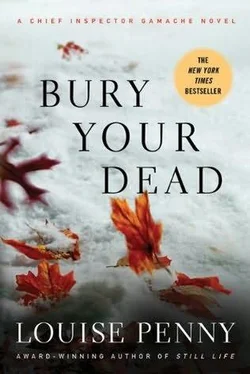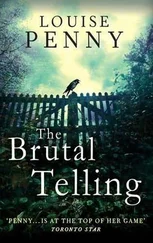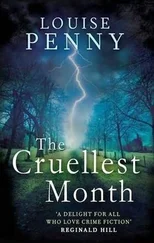Louise Penny - Bury Your Dead
Здесь есть возможность читать онлайн «Louise Penny - Bury Your Dead» весь текст электронной книги совершенно бесплатно (целиком полную версию без сокращений). В некоторых случаях можно слушать аудио, скачать через торрент в формате fb2 и присутствует краткое содержание. Жанр: Старинная литература. Описание произведения, (предисловие) а так же отзывы посетителей доступны на портале библиотеки ЛибКат.
- Название:Bury Your Dead
- Автор:
- Жанр:
- Год:неизвестен
- ISBN:нет данных
- Рейтинг книги:4 / 5. Голосов: 1
-
Избранное:Добавить в избранное
- Отзывы:
-
Ваша оценка:
- 80
- 1
- 2
- 3
- 4
- 5
Bury Your Dead: краткое содержание, описание и аннотация
Предлагаем к чтению аннотацию, описание, краткое содержание или предисловие (зависит от того, что написал сам автор книги «Bury Your Dead»). Если вы не нашли необходимую информацию о книге — напишите в комментариях, мы постараемся отыскать её.
Bury Your Dead — читать онлайн бесплатно полную книгу (весь текст) целиком
Ниже представлен текст книги, разбитый по страницам. Система сохранения места последней прочитанной страницы, позволяет с удобством читать онлайн бесплатно книгу «Bury Your Dead», без необходимости каждый раз заново искать на чём Вы остановились. Поставьте закладку, и сможете в любой момент перейти на страницу, на которой закончили чтение.
Интервал:
Закладка:
Armand Gamache had hoped that after the initial interviews his obligation to Elizabeth MacWhirter and the rest of the Lit and His would be over. But he now knew that wasn’t true. Renaud had demanded to meet the board, the board had refused, then they’d purged the incident from the minutes. When word got out there’d be hell to pay. And it would be the Anglos who had to pay it.
No, Gamache thought as he and Henri trudged out the gates, he couldn’t leave them. Not yet.
The snow had almost stopped and the temperature was dropping. There was no traffic, not a sound except Gamache’s feet squeaking on the snow.
It was three twenty in the morning.
Every day Gamache woke at about that time. At first he’d tried to get back to sleep, had stayed in bed, had fought it. But now, after weeks and weeks, he’d decided this was it, for now. Instead of fighting, he and Henri would get up quietly and go for a walk, first around their Montreal neighborhood and now here in Quebec City.
Gamache knew that in order to get through the day he needed this quiet time with his thoughts at night.
He needed this quiet time with the voice in his head.
“My father taught me to play the fiddle,” Agent Paul Morin said, in answer to Gamache’s question. “I was about four. We have some home video of it somewhere. My father and grandfather playing the fiddle behind me, and me in front wearing these great big sagging shorts, they look like diapers.” Morin laughed. “I had my little fiddle. My grandmother was on piano and my sister pretended to conduct. She was about three. She’s married now, you know, and expecting.”
Gamache turned left and walked through the darkened Carnaval site at the foot of the Plains of Abraham. A couple of guards watched but didn’t approach. Too cold for confrontation. Gamache and Henri wound along the pedestrian walk, past attractions that would be filled with excited kids and freezing parents in just a few hours. Then the stalls and temporary buildings and rides trailed off and they were walking through thin forest toward the infamous open field and the monument erected where the English General Wolfe fell, and died, on September 13, 1759.
Gamache scooped up a handful of snow and crushed it into a ball. Henri immediately dropped the tennis ball and danced around. The Chief cocked his arm, smiling at Henri, who suddenly crouched. Muscles tense. Waiting.
Then Gamache threw the snowball and Henri raced after it, catching it in mid-air. He was ecstatic for a moment then his jaws closed, the snow disintegrated and Henri landed, perplexed as always.
Gamache took the tennis ball encrusted with frozen saliva, put it in the Chuck-it and tossed. The brilliant yellow ball sailed into the darkness with the shepherd sailing after it.
The Chief Inspector knew every inch of the Champs-de-Bataille, in every season. He knew the changing face of the battlefield. Had stood there in spring and seen the daffodils, had stood there in summer and seen the picnickers, had stood there in winter and watched families cross-country ski and snowshoe, and he’d stood there in early autumn. On September 13. The exact day of the battle, when more than one thousand men had died or been wounded in an hour. He’d stood there and believed he heard the shouts, heard the shots, smelled the gunpowder, seen the men charging. He’d stood where he believed Général Montcalm had been when he realized the full nature of his mistake.
Montcalm had underestimated the English. Their courage and their cunning.
At what point did he know the battle was lost?
A runner had appeared in Montcalm’s camp, upriver from Québec, the night before. Exhausted, almost incoherent, he’d reported the English were scaling the 150-foot cliffs from the river and were on the field belonging to the farmer Abraham just outside the city.
Montcalm’s camp hadn’t believed him. Thought the man mad. No commander would issue such an order, no army would obey it. They’d have to have wings, Montcalm had laughingly told his generals and gone back to bed.
By dawn the English were on the Plains of Abraham, prepared for battle.
Was that when Montcalm knew all was lost? When the English, armed with wings, had done the impossible? The Général rushed there and had stood on the very spot Gamache now stood. From there he’d looked over the fields and seen the enemy.
Did Montcalm know then?
But still the battle needn’t have been lost. He could have prevailed. But Montcalm, the brilliant strategist, had more mistakes to make.
And Gamache thought about that moment when he’d realized his own final and fatal mistake. The enormity of it. Though it had taken him a few moments to grasp as everything unraveled, fell apart. With such speed, and yet it seemed now, so slowly.
“Homicide,” his secretary had said, answering the phone.
Beauvoir had been in his office when the call came through, discussing a case in Gaspé. She’d stuck her head in the door.
“It’s Inspector Norman, in Ste-Agathe.”
Gamache looked up. She rarely interrupted him. They’d worked together for years and she knew when to handle it herself, and when not to.
“Put him through,” said the Chief. “ Oui, Inspector. What can I do for you?”
And so the battle had begun.
Je me souviens, thought Gamache. The motto of Québec. The motto of the Québécois. I remember.
“I was at Carnaval once,” Agent Morin said. “It was great. My dad took us and we even played fiddle at the skating rink. Mom tried to stop him. She was embarrassed, and my sister could have died, but Dad and I took out our fiddles and started playing and everyone seemed to really like it.”
“That piece you played for us? ‘Colm Quigley’?”
“No, that’s a lament. It gets faster, but the beginning’s too slow for skaters. They wanted something peppier, so we did some jigs and reels.”
“How old were you?” Gamache asked.
“Thirteen, maybe fourteen. It was about ten years ago. Never went back.”
“Maybe this year.”
“ Oui . I’ll take Suzanne. She’d love it. Might even take the fiddle again.”
Je me souviens, thought Gamache. That was the problem. Always the problem. I remember. Everything.
In the cabin in the woods Beauvoir lay awake. Normally he slept soundly, even after what happened. But now he found himself staring into the dark rafters, then at the glow of the fireplace. He could see Dr. Gilbert asleep on the two chairs he’d pulled together. The asshole saint had given Beauvoir the bed. Beauvoir felt horrible, having an elderly man who’d been so kind, sleep on a couple chairs. And he wondered, briefly, if that was the point. Why be a saint unless you could also be a martyr?
Perhaps it was the peaceful cabin, perhaps it was exhaustion after pushing himself too far, or the little half pill, but Beauvoir’s defenses were down.
And over the wall swarmed the memories.
“Homicide,” the Chief’s secretary had said. Gamache had taken the call.
11:18 the clock had said. Beauvoir had looked around the room, letting his mind wander, as the Chief spoke on the phone with the Ste-Agathe detachment.
“Agent Morin’s on the phone.” Gamache’s secretary appeared again at the doorway a moment later. The Chief covered the mouthpiece and said, “Ask him to call back in a few minutes.”
Gamache’s voice was hard and Beauvoir immediately looked at him. He was taking notes as Inspector Norman spoke.
“When was this?” Gamache’s sentences were clipped. Something had happened.
“He says he can’t.” The Chief’s secretary hovered, uncomfortable, but insistent.
Gamache nodded to Beauvoir to take the Morin call, but Gamache’s secretary stood her ground.
Читать дальшеИнтервал:
Закладка:
Похожие книги на «Bury Your Dead»
Представляем Вашему вниманию похожие книги на «Bury Your Dead» списком для выбора. Мы отобрали схожую по названию и смыслу литературу в надежде предоставить читателям больше вариантов отыскать новые, интересные, ещё непрочитанные произведения.
Обсуждение, отзывы о книге «Bury Your Dead» и просто собственные мнения читателей. Оставьте ваши комментарии, напишите, что Вы думаете о произведении, его смысле или главных героях. Укажите что конкретно понравилось, а что нет, и почему Вы так считаете.











